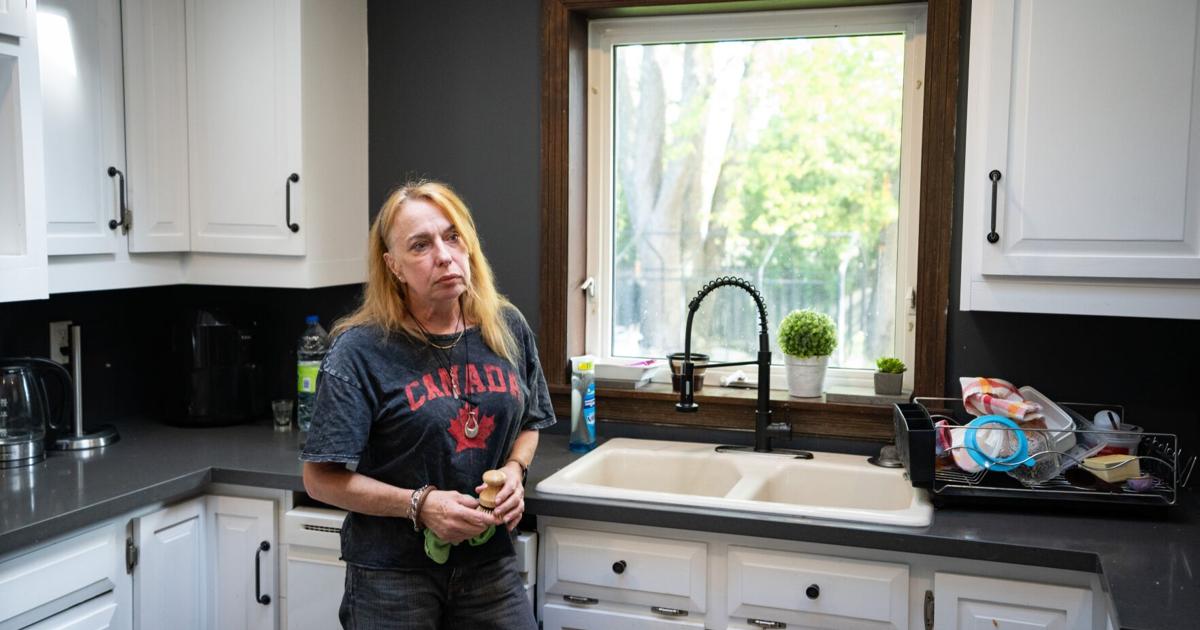One snowy day earlier this year, Yvonne Morrish returned to her Scarborough bungalow to find the locks had been changed.
Despite living there for decades — her kids’ heights are scribbled on the inside of the closet door on the main floor — she was being thrown out of her own home.
RiverRock Mortgage Investment Corp. had taken legal possession, a notice on the door read, after she missed a mortgage payment.
Morrish was in “total disbelief and shock, then shattered,” she recalls.
It almost felt like a death.
“Grieving for something you can no longer change the outcome of.”
Nick Kyprianou, president and CEO of RiverRock Mortgage Investment Corp., said he could not discuss the specifics of Morrish’s case because of privacy laws.
But he confirmed she has a mortgage with the company and that she missed a payment in late 2024.
“A mortgage is the simplest contract in the world. If a legal action has commenced it’s because you’re not making your payments and we couldn’t come to some kind of resolution,” he said in a phone interview.
What happened to Morrish is called a power of sale, when a borrower defaults on their mortgage and the lender takes over to sell a home and recoup what they are owed.
Once very rare, powers of sale are rising across the Greater Toronto Area, especially in suburbs such as Brampton, Brock and Scarborough, according to data from MLS provided to the Star by John Pasalis, president and broker of record at Realosophy Realty.
The north Scarborough neighbourhood of Highland Creek, on the border of Morrish’s home, tops the list of neighbourhoods across the GTA, with 9.9 per cent of listings being a power of sale — or roughly 1 in 10 new listings — from January to September this year.
More lenders are seizing homes, a process they can start after only one missed mortgage payment, as paying off a mortgage becomes harder for homeowners.
Thousands are coming up for renewal at higher interest rates as unemployment climbs, the cost of living skyrockets, and over-leveraged owners who bought at the height of the pandemic see their property values tank.
The increase is a sign more owners are under pressure in a distressed market.
Morrish, a single mom who has struggled with chronic health issues, said over the last 15 years she dipped into the equity in her three-bedroom home to open a couple of small businesses that ultimately failed.
“Everything means so much to me here. I know it’s only stuff, but it’s just so heartbreaking. I wish I wouldn’t have gotten myself into this situation,” said the 63-year-old.
“I know it’s my responsibility, I know that, but it’s killing me, it really is.”
She worked with several lenders before getting involved with RiverRock, around 2022. RiverRock is a mortgage investment corporation (MIC), meaning the lender is financed by capital from investors, as well as repaid funds from borrowers.
Most people get their private mortgages from MICs, which often lend to those denied by banks.
Morrish said after she was unable to make her mortgage payment of about $6,200 in December 2024, the company tried to claim her home was abandoned — which would allow them to change the locks faster.
RiverRock’s Kyprianou reiterated that he could not discuss specifics, but said it’s “not true” that the home wasn’t abandoned.
“As far as legal actions are concerned, we never deviate,” he said. If a home is “deemed abandoned” under the law the company can change the locks, he added. “There’s a whole process on that.”
Kyprianou said the company always tries to work with people to find a solution.
They “take care of everything” for borrowers including hiring movers and helping them find another place to live, even paying first and last month’s rent.
He said their powers of sale have actually come down over the last couple of years because of their strategy of working with borrowers, and they currently only have “five or six” ongoing in Ontario.
Morrish was able to get back into her home with the help of her realtor Jonathan Alphonso, who said he guessed the lockbox code that RiverRock had put on the door.
She’s still living in the house — on the advice of her lawyer who told her that as long as she was there it couldn’t be claimed as abandoned.
The pool in the large backyard is filled with yellow leaves, as she couldn’t afford to fix the liner.
But the bungalow has been lovingly decorated with quirky antique pieces, featuring a dramatic dark accent wall and an updated kitchen flooded with light from a large skylight.
One of her two birds, Rainbow, flies from room to room as her five dogs run about.
“It’s got a lot of history, it’s got a lot of memories,” she said.
Morrish is “embarrassed” to share her story but knows she’s not the only one in this situation.
“Our homes mean something to us,” she said.
According to court documents, she owed about $792,000 on the home as of January, including interest and various fees, and owes more now.
Morrish is not sure what will happen next, and has a court case on the matter coming up next month.
Under a power of sale, the borrower remains the owner of the property and can receive any profit, after the debt is paid off.
In better times, a forced sale might provide someone like Morrish with a little cash to get back on her feet. But in today’s real estate market there’s often not any money left.
While Morrish’s case is complicated by a number of personal factors, Realosophy Realty’s Pasalis said the surge in forced sales is partly due to people being met with much higher interest rates at mortgage renewal, as many had very low rates five years ago during the pandemic.
He also suspects a lot of owners in this situation are “overextended” investors.
He crunched the numbers on the percentage of new MLS listings across the GTA that were powers of sale from January to September this year, which he shared with the Star.
He found powers of sale have soared across the city, to almost one per cent of new listings in Toronto.
He doesn’t have data on what they were in the past, the MLS database is only available to realtors and requires searching for the terms “power of sale” in listings.
But it would have been “insignificant” and “extremely rare several years ago,” he said.
The full gamut of properties, from condos (0.67 per cent) to detached homes (1 per cent) are impacted.
It’s particularly high in the suburbs, like Brock (2.87 per cent), Stouffville (1.52 per cent), Milton (0.94 per cent), Oshawa (1.42 per cent) and Brampton (1.38 per cent).
“All of these areas generally saw this massive boom during COVID,” Pasalis said, noting they’ve all had big dips in average home price since 2022, as much as 30 per cent in Brampton, according to Toronto Regional Real Estate Board data.
“Brampton is probably a little bit more vulnerable because they had a lot of investors buying houses to use as student housing and that has really fallen apart,” he added, with the federal government placing a cap on international students in 2024.
In terms of neighbourhoods, Highland Creek is the highest, followed by West Shore in Pickering (4.9 per cent), and Beaverton in Brock (4.5 per cent).
Pasalis cautioned that a small number of powers of sale could inflate the percentages within areas where there weren’t many new listings, and some could be duplicates, if homes didn’t sell and were relisted.
But for every 1,000 powers of sale there are probably 2,000 or 3,000 households behind on their payments and trying to sell their homes themselves, he said.
In his experience, “virtually every lender” wants to work with owners to keep them in their homes.
Canadians will do everything to avoid falling behind on their mortgages, including letting credit card and car loans pile up, he added.
It’s a slow process.
“People hang on as long as possible.”
More Ontarians are missing mortgage payments than at any time since credit agency Equifax started tracking them in 2012, according to June data.
Some of the major banks have seen a rise in mortgage delinquency rates of 90 days or more. BMO’s mortgages whose borrowers are late on payments have more than doubled in two years to 0.37 per cent in the third quarter of 2025, up from 0.15 per cent from the third quarter of 2023.
Scotiabank’s is at 0.25 per cent, up from 0.14 per cent two years ago; and CIBC is at 0.36 per cent, having increased from 0.17 per cent over the same period.
Alphonso, who is both a real estate agent at Royal LePage Terrequity Realty and a broker with mortgagebrokerstore.com, said calls have been flooding his Toronto office from across the region as desperate borrowers facing powers of sale ask for help.
He worked with Morrish to try and sell her home earlier this year.
She accepted offers twice, but both sales fell through, she said.
If a borrower has missed a mortgage payment, the lender is allowed to pursue a power of sale about two weeks later, Alphonso said.
Major banks, which are heavily regulated by the government, typically wait three months and work diligently with the borrower to try and keep them in their home.
But private lenders don’t have the same guidelines.
Like Morrish, RiverRock’s Kyprianou also compared losing a home to dying.
He pointed to the five stages of grief: denial, anger, bargaining, depression and acceptance.
In this metaphor, homeowners are the ones who must accept what’s happening, before things get worse.
“They go through the same stages, right? So you have to be very sensitive to that and get them to stage five as quickly as possible to solve the problem, so they don’t erode their equity.”



